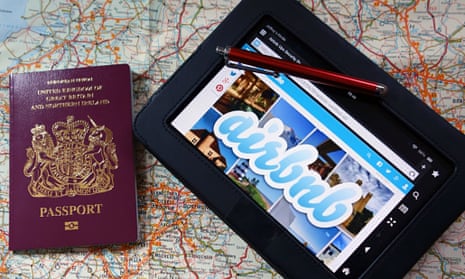The key will be under a milk bottle, said the email, and it had better be. I had flown to Sydney for a month-long stay in an apartment, booked via Airbnb, and I would have been in disarray if there had been something wrong. But the key was there, and, eventually, so was a line in my credit-card bill commensurate with staying for four weeks on the seafront at Bondi beach. The elderly couple who owned the apartment block were shocked when I told them how much their tenant had sublet for: several times the rent he was paying.
It was my first experience of the so-called “sharing economy”, and it was good. The platform – Airbnb – worked, and I built up some of the vital capital of the peer-to-peer economy: trust. The place was a lot more like it said it was than most hotels are. And, unlike most hotels, the Wi-Fi worked.
But consider the economics of what happened: the elderly couple owned an asset that was generating rent. The tenant then – informally – leased out his own rights to be there, generating yet more rent. And the owners of Airbnb were generating economic rent out of their asset – the peer-to-peer booking and payment platform that has a near-monopoly of the market.
It’s similar to what happens with Uber: people who are lease-purchasing a car use it to generate extra informal income, while other revenue goes to the platform operating the market.
That’s how the official economics work. But there’s an unofficial economic force at work in these sites: the network effect. Bell Telephone boss Theodore Vail described the principle behind the network effect in 1908 when he pointed out that the more users there are on a telephone network, the more useful it is to each of them.
Economists came to describe this benefit of collaboration as a “positive externality”. And the clue is in the name. It’s good, but it comes from somewhere outside the strict market relationship between two parties in a contract. The next problem is how to quantify the benefit – and decide who should own it. In Vail’s day, the answer was easy: he had a monopoly, so any commercial upside – made from each telephone being more useful as the network grew – would go to the company.
It was not until the advent of networked computing that economists had to get their heads around the biggest problem, which haunts our modern corporate existence: it may not be possible to capture or measure all the benefits of networks inside a market system.
Consider the ethernet port. You still find them in hotels, or on old computers, but, in the 1980s, they were avant garde: your own personal rubbery link to the internet. Robert Metcalfe, who invented the ethernet, came up with a highly optimistic “law” to measure the benefits. The cost of building an ethernet network, he said, grew in a straight line; the value of the network would grow by the number of users squared: it produced an exponential curve. “I was a little vague about what ‘value’ was, but in those days it had something to do with sharing expensive disks and printers, exchanging electronic mail within buildings,” he admitted 25 years later.
In fact, the true value of the positive externalities is a thing deeply troubling to economics: it is a mixture. It is part extra usefulness and part commercial gain. And economics – from Adam Smith to Marx to Milton Friedman – is founded on the strict separation of the two. A thing’s usefulness and its value are linked, but separate, concepts.
For Metcalfe, the assumption was that, by linking everybody’s desktop, there would be much more value generated out of the things attached to it: the hard drive, the printer, etc. But the dotcom revolution fostered a different approach. Corporations such as Apple, Amazon, Facebook or eBay are effectively capturing the usefulness generated by many people interacting – buying, selling, recommending – as monetary value. You buy advertising per click, and the number of clicks rises if people are feeling the intangible buzz of sharing their information.
So, if early telecoms companies were effectively saying: “Hey, we have this extra thing – the network effect – to add to our profitability”, the internet giants of the 2000s said: “The network effect is the business model.” But the internet giants were built as monopolies, jealously guarding their ownership of the information generated by our sharing activities. The stock-market valuation of each of them implies that, long term, they have to take over and destroy much of the rest of the capitalist market.
What has emerged now, in the form of Uber, Airbnb and the other sharing platforms, is a different model. The utility is transparent and the benefits distributed more transparently. I know what I am paying per week to rent my Bondi flat (a lot); I know what I am paying Airbnb to handle the transaction and provide assurance (likewise, a lot). But I can be a producer in this business as well as a consumer. I can rent my own flat or register my own car to provide cab rides.
So, while the “old” monopoly models of the 2000s only distrupted dinosaur businesses – such as print publishers or booksellers – the new sharing businesses can actually disrupt society. Barcelona, which has banned Uber and hit Airbnb with heavy fines, was responding to protests by cab drivers anxious to protect their trade, and the tourist industry, which wanted people renting out their flats to pay for registration, as non-air B&Bs actually do.
The sharing model is in its infancy, and there are plenty of me-too businesses trying to make it work in other sectors (cars, bikes, high-end cameras, etc). And, beyond the issues of consent – as in Barcelona – it poses two challenges. First, however brilliant these new models are, they cannot produce exponential growth. It is technology in the service of squeezing out the final drops of value from something, rather than infinite expansion.
Second, who owns the upside? Once the platforms to rent out things, services or time are stable, textbook economics states that the cost of using them should fall. So, what if you applied the sharing principle without seeking a profit at all? What if these very platforms could be taken over by society and repurposed so that all the benefit went to the consumer or to society itself? The socialists of the early 20th century eyed monopolies like Vail’s with optimism: take them over and their highly organised and unitary status means you can use them to run the economy. Today, if you wanted to re-order the economy to deliver participation and choice alongside social justice, it’s the sharing models you would start from.
The arrival of sharing changes the game when it comes to the social potential of technology. It was hard to see a route from Apple and Google to “dotcommunism”. It is quite easy to see it, though, if you began with the sharing sites, and made them cheap or free.
Paul Mason is economics editor of Channel 4 News. Follow him @paulmasonnews Read his blog here.

